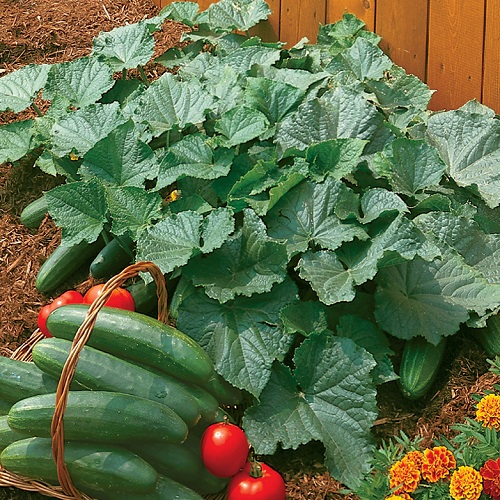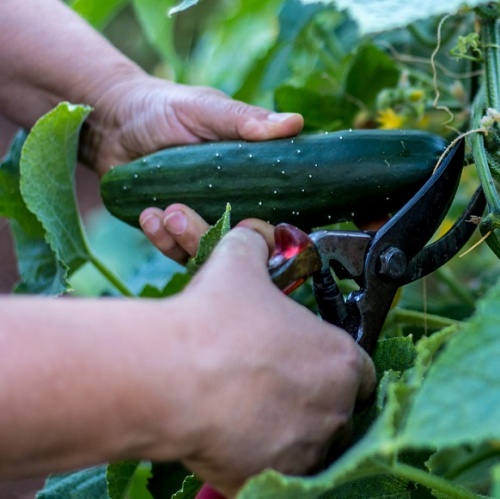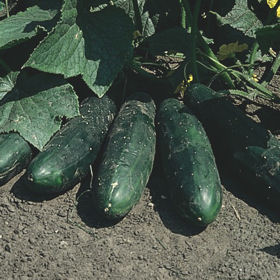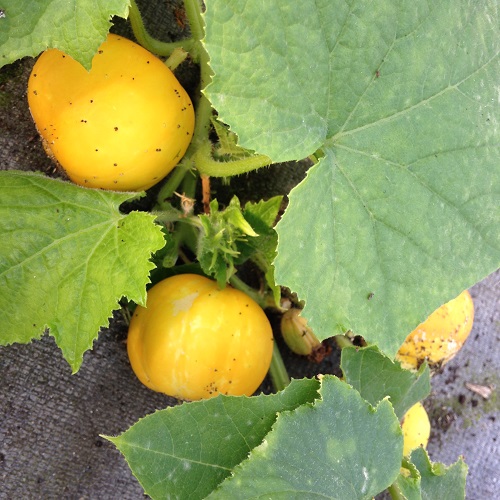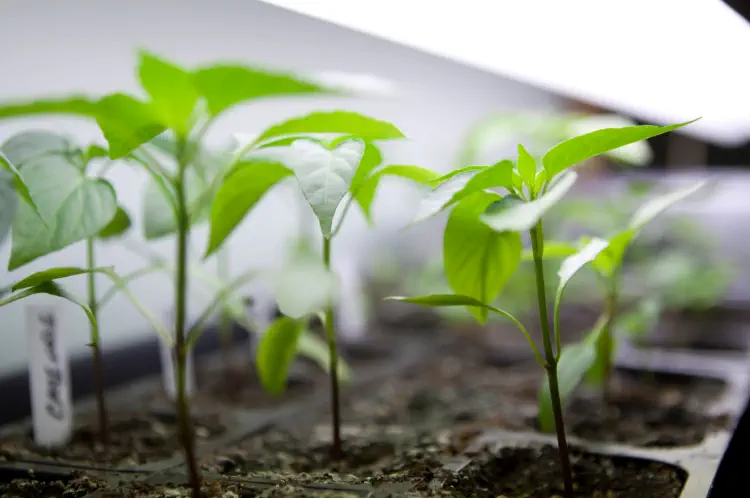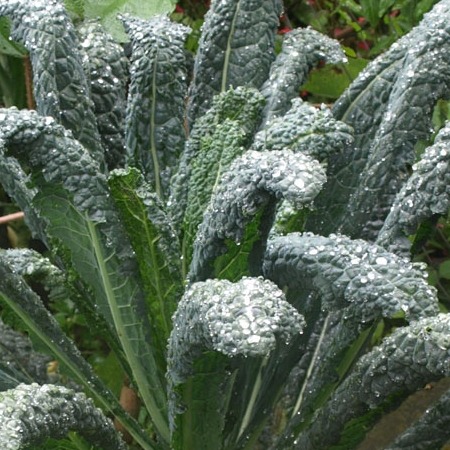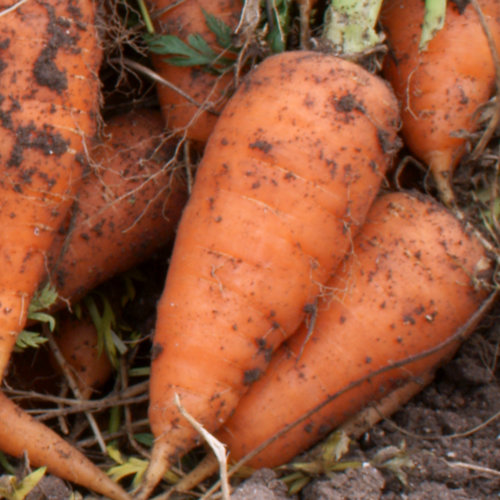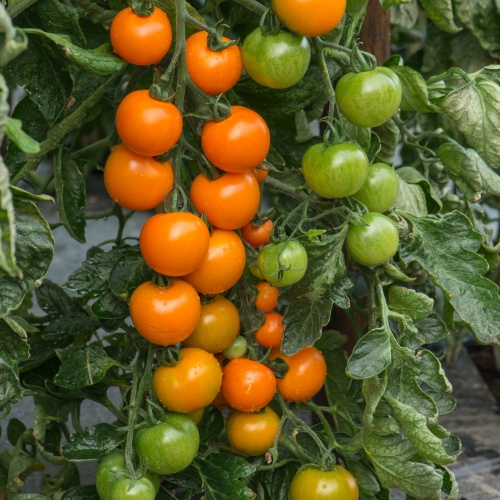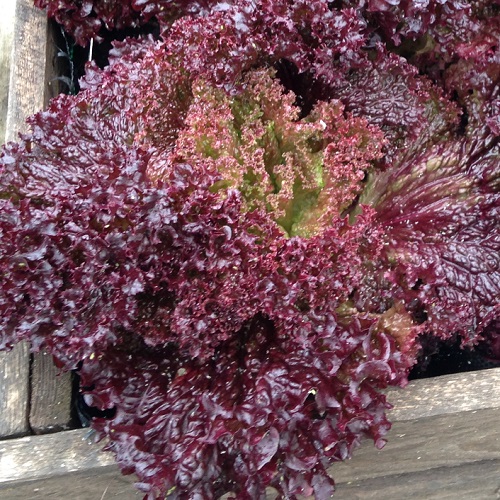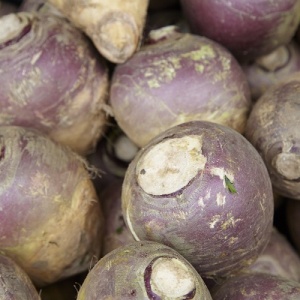Are you trying to decide between hardneck garlic and softneck garlic for your garden? Knowing what's the right variety for you and your garden will help you choose the best option. In this post we’ll go over the differences in growing conditions, flavour profiles and storage to help you decide which one is the preferred choice for you.
Growing Cucumbers Outdoors
Growing cucumbers outdoors is easier than most people might think but if you have never grown outdoor cucumbers before then you could be in for a surprise. Walk into any supermarket or greengrocers and the cucumbers you see on display will most often be long with smooth medium to light green skins. This is the typical cucumber that we have all come to know, love and accept as the norm. These cucumbers have also very likely been grown in a greenhouse or benefitted from the protection of a poly-tunnel.
What you will not see in the shops are small, dark coloured cucumbers with spiky, knobbly skins because these cucumbers don’t look as presentable as their undercover-grown counterparts. However, these little ‘rough and ready’ fruits taste just as good as any other cucumber, proving that looks can be very deceiving. The outdoor cucumber is known as a ridge cucumber because traditionally they were grown on a mound of soil or ridge. Some amateur growers still prefer to grow them on top of mounds of well-rotted compost although this isn’t strictly necessary.
Getting your outdoor cucumbers started
It is actually quite easy to grow cucumbers from seeds, provided to sow at the right time, and give them warmth. The seeds can be started off on indoors on a warm windowsill or in a greenhouse from late April. Using a heated propagator can provide a big advantage to germination success. Place 2 seeds on their side or with the pointed end facing upwards at 2cm deep in a 7.5cm pot of seed compost. Apply water and leave to germinate. The pots can be covered in cling-film, which can help retain moisture and warmth. The seeds will normally germinate within 5-7 days. Once the true leaves appear, remove the weaker of the two seedlings and place the pots in a warm and preferably sunny position where they will benefit from plenty of light.
After 10-14 days apply a dilute liquid feed at each watering for the next 2 weeks. They should be ready for planting out into their final growing positions after 4 weeks from germination. Alternatively, and if weather conditions allow, cucumber seeds can be sowed directly outdoors into prepared planting beds, growing bags or containers during the warmer months of May or June, after all risk of frost has passed.
Best Cucumber Varieties to Grow Outdoors
Bush Chamion is an outdoor bush variety, suitable.....
Packet Content: 15 Seeds
Burpless Tasty is a popular amateur variety suitable for outdoor.....
Av. Packet Content: 15 Seeds
Marketmore is an outdoor ridge variety, producing.....
Packet Content: 20 Seeds
Lemon is an unusual cucumber variety that produces 'lemon shaped'.....
Packet Contents: 20 seeds
Outdoor soil preparation and planting out
Outdoor cucumbers need a warm and sunny position, which should have been previously well prepared. To get the best out of your ridge cucumbers, the growing area should include some well-rotted organic matter, which has been dug in during the autumn or winter months. Outdoor cucumber plants generally need some support, in the form of canes, wires and netting, or if you prefer, you can allow them to sprawl across the ground over straw, which will help protect them from coming into contact with the soil. Space out plants at 45cm apart and apply a light sprinkling of a general granular fertiliser around the base of the plants.
Caring for outdoor cucumber plants
When the plants become established and begin growing freely, apply a mulch to the base of the plants, which will help retain moisture. It is advisable to pinch out the main growing stem after 7 leaves have formed because cucumber plants will often keep growing and spreading at the expense of producing flowers and fruits. Water accounts for a very high percentage of cucumber fruits, so ensure the plants are watered regularly. Little and often is best to prevent the fruits from splitting.
Applying a potash based fertiliser or liquid feed every 2 weeks after the fruits have begun to develop will encourage healthy plants and quality cucumbers.
When to harvest outdoor cucumbers
Outdoor cucumbers are usually ready for harvesting from 8-10 weeks after sowing or when the cucumbers are about 20cm-25cm long. Cucumbers grow very quickly, especially during warm and sunny periods, so best check the plants regularly and pick them as soon as they are sizeable. Use a sharp knife to cut the cucumbers from the plant either in the morning or evening, when it’s cooler. Harvesting cucumbers regularly will also encourage the production of more flowers and fruits. It’s always best to remove any fruits that are turning yellow or not developing properly.
Cucumber pests and diseases
Protect plants against slugs and snails with beer traps, copper tape, crushed egg shells, wood pellets, grit or ash, coarse sand and even ground coffee beans. Slugs and snails are unable to travel over sharp or loose surfaces so these methods will help to discourage them. Slug pellets are very effective but can harm wildlife that might feed on these pests such as birds and small amphibians. Aphids can also be a nuisance and are best controlled with neem oil, added to a mild detergent and water solution. If cucumber beetles are a problem, a dusting of Sevin Dust is recommended.
Most notable diseases include fungal infections such as Leaf Blight, Downy Mildew, Powdery Mildew, Fusarium Wilt and Verticillium Wilt. Most fungal infections can be treated with a proprietary fungicide with the exception of Verticillium Wilt. There is no chemical control for this soil-borne fungus. Bacterial infections such as Leaf Spot and Bacterial Wilt also have no effective treatments. Good hygiene and management will help prevent most infections.
What is your favourite Cucumber variety? Leave a comment below and let everyone know....
All blog content on this page is copyright of SimplySeed and is not to be reproduced without prior written permission. ©

